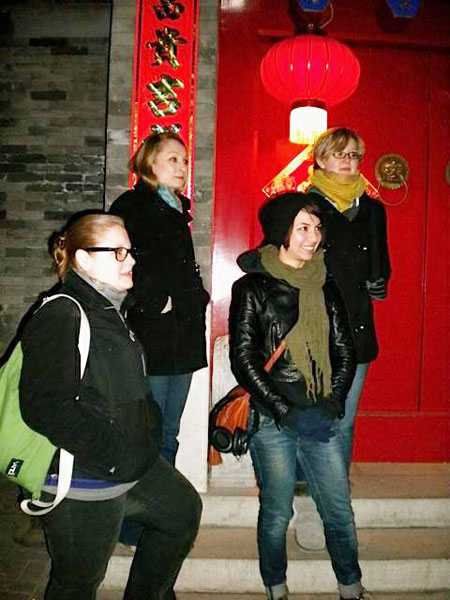Ghost of a chance
 |
|
A group of tourists explore an old hutong in the neighborhood of Houhai, where tour guides share ghost stories with the visitors. Provided to China Daily |
Empress Dowager Cixi, a powerful woman who controlled the Qing Dynasty (1644-1911) for 47 years, hated Consort Zhen - the favorite concubine of Emperor Guangxu. Because Consort Zhen encouraged Guangxu to be more independent and reform the country, Zhen really got on Cixi's nerves.
When the Eight-Nation Alliance invaded in 1900, Cixi saw this as an opportunity to eliminate Zhen, and got several eunuchs to throw her down a well in the Forbidden City.
"Rumor says that when people fished her body out of the well, she was rather lifelike-looking. Somebody said she was already a ghost just waiting to get revenge on Cixi," said Pegg, who showed us the lady's photos and a mischievous short video about how she was killed.
"Ghost stories tell us a great deal about the history and culture of the societies in which they evolved. Also, a lot of the stories you hear on our ghost tours played an important role in China's history," Newman said.
Prince Gong's Mansion used to belong to He Shen, one of the most corrupt officials in Chinese history. As he managed to get Emperor Qianlong's favor, He was able to do anything he wanted. After the next emperor ordered him to kill himself, a huge amount of gold, silver, jewelry and priceless treasures was found in He's house.
A widespread rumor says that when Qianlong was a boy, one of his father's concubines committed suicide because she accidentally smacked the boy when playing hide-and-seek. Feeling quite guilty, Qianlong bit his thumb and left a bloody mark on her forehead to identify her spirit in her next life.
Pegg said it was said that He Shen looked a lot like the concubine. Besides, He was born in the same year that the concubine died and had a red birthmark in the same place.
The guides also took us to a local barbecue store to see the night fair, where most locals go to have a midnight snack. But we all refused to have a bite of the spooky specialty - the barbecued sea horse, starfish and small scorpions.
On the way, we learned various ghost stories, such as the haunted house in Beijing and the popular spooky stories in the neighborhood. "Chinese ghosts are more varied and open-minded than their Western counterparts. I believe it's because the Chinese polytheism - Buddhism, Taoism and Confucianism - exist simultaneously and are not contradicting one another," Newman said.
He said they had experienced Chinese and English-native-speaking researchers to look for the most interesting historical anecdotes, by reading books and online articles and talking to local experts. Many stories had never been translated into English before.
We were so intrigued by these excellent stories on the way that we were not aware he was missing until we bumped into a "Chinese vampire" in Houhai Park. The whole group burst into laughter when a zombie with a colorful mask, dressed in a typical Qing Dynasty-style costume, suddenly bounced toward us.
The ghost shouted painfully and asked one of the ladies to marry him to fulfill his last wish. With the laughter from us and other people in the park, a poor lady had to exchange vows and tokens with him, so he could leave happily by bouncing away.
On my way back, I was still haunted by the metro story and observed other passengers to watch for invisible spirits.














